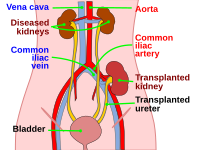
Photo from wikipedia
Purpose of review Intensive care management of patients who have undergone organ transplantation of liver, small bowel, pancreas, and/or kidney requires a basic knowledge of immunosuppression principles and the management… Click to show full abstract
Purpose of review Intensive care management of patients who have undergone organ transplantation of liver, small bowel, pancreas, and/or kidney requires a basic knowledge of immunosuppression principles and the management of immunosuppressive medications. This review highlights the core principles of immunosuppression management in abdominal organ transplantation with a focus on complications arising from immunosuppressive drugs, both in the immediate postoperative period and in long-term usage. Recent findings The general principles of management of immunosuppression in the abdominal organ transplant population have remained largely unchanged. Improvements in drug monitoring coupled with improvements in knowledge of pathways involved in allograft rejection have further refined immunosuppressive therapy. Infectious and central nervous system complications remain prevalent and are common complications of immunosuppressive drug therapy. Summary For the intensive care professional who cares for abdominal organ transplant recipients, a foundational knowledge of the core principles of immunosuppression management is essential. In addition, an understanding of the common immunosuppressive drug regimens and the complications associated with these regimens is required for optimal management, risk assessment, and outcomes.
Journal Title: Current Opinion in Critical Care
Year Published: 2022
Link to full text (if available)
Share on Social Media: Sign Up to like & get
recommendations!